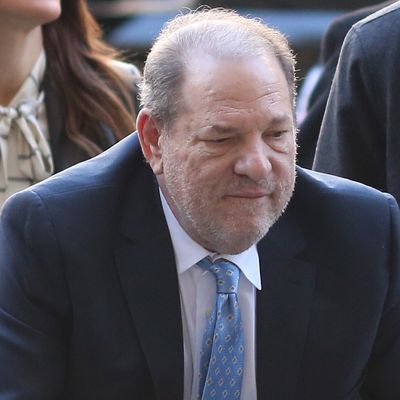
Update, July 14: Judge Alvin K. Hellerstein denied preliminary approval of the controversial settlement Tuesday morning, in large part taking issue with how the deal grouped together women who were victimized in dramatically different ways. The proposed settlement includes two “subclasses” of women — those who met Weinstein before 2005, in the context of his work at Miramax, and those who met him after 2005, in the context of his work at the Weinstein Company.
“What is there to make me believe that a person who just met Harvey Weinstein has the same claim as [a woman] who was raped by Harvey Weinstein?” Hellerstein asked Elizabeth Fegan, one of the main attorneys supporting the settlement. “Your honor, based on our investigation … every woman who came into contact with Harvey Weinstein was absolutely assessed by him to determine whether she was vulnerable” Fegan said. While there was a process to determine how much accusers would get, in relation to their specific allegations, Hellerstein didn’t buy it, issuing his decision after just 20 minutes. “I will not give preliminary approval to the settlement,” Hellerstein said. He told lawyers to work out a better deal “instead of wasting your time with phony settlements that [attempt to] create a class that doesn’t exist.”
June 30, 2020: A group of women who sued Harvey Weinstein for alleged sexual misconduct agreed to an $18.875 million settlement with the disgraced producer, his former film company, and several people who had worked there, the women’s lawyers announced Tuesday. The deal, which still needs court approval before going into effect, would also settle the New York State attorney general’s lawsuit against him. Weinstein was convicted of third-degree rape and first-degree criminal sexual act on February 24 in his Manhattan criminal case; on March 11, he was sentenced to 23 years in state prison.
The accusers who reached this agreement include Louisette Geiss, Sarah Ann Thomas, Melissa Thompson, Melissa Sagemiller, Nannette May, Katherine Kendall, Caitlin Dulany, Larissa Gomes, and a woman referred to as Jill Doe. This settlement, if approved, wouldn’t only apply to these women. The nearly $19 million would establish a “victims’ fund allowing all women who were abused by Harvey Weinstein under certain circumstances to make claims for damages in a confidential and non-adversarial process,” the women’s lawyers said in a press release.
The state attorney general’s office said that under the deal, “women who had previously signed confidentiality, non-disclosure, or non-disparagement agreements with [The Weinstein Company] or any of the former representatives of the company related to any sexual misconduct by Harvey Weinstein, will be released from those clauses and free to tell their stories without fear of retribution.”
The agreement doesn’t come without controversy.
Douglas H. Wigdor and Kevin Mintzer, who represent several Weinstein accusers that aren’t participating in the settlement, called the deal a “complete sellout of the Weinstein survivors …”
They said in a statement that under the deal, Weinstein “accepts no responsibility for his actions” and that he “isn’t paying any money toward the settlement despite now having been found guilty in Manhattan criminal court.”
Regardless of the controversy, there are several steps that would have to happen before the settlement is finalized. The agreement still has to be approved by bankruptcy and Manhattan federal courts. If the Manhattan federal-court judge overseeing this case agrees to preliminary approval, other women who might qualify will be notified about the settlement. People will have time to make claims and objections. Eventually, there will be a “fairness hearing” that will determine whether final approval is granted.
The settlement doesn’t bring an end to Weinstein’s many other legal woes, including other civil litigation and his ongoing criminal case in Los Angeles.
On July 1, Imran Ansari, one of Weinstein’s attorneys, issued a statement on the agreement, saying, “With closure in sight on one front, Mr. Weinstein remains intently focused on defending himself on all remaining legal matters, including the appeal of his criminal conviction, civil lawsuits, and the charges filed against him in L.A. He continues to pursue all legal recourse available to him and remains steadfast in the defense of those matters.”


